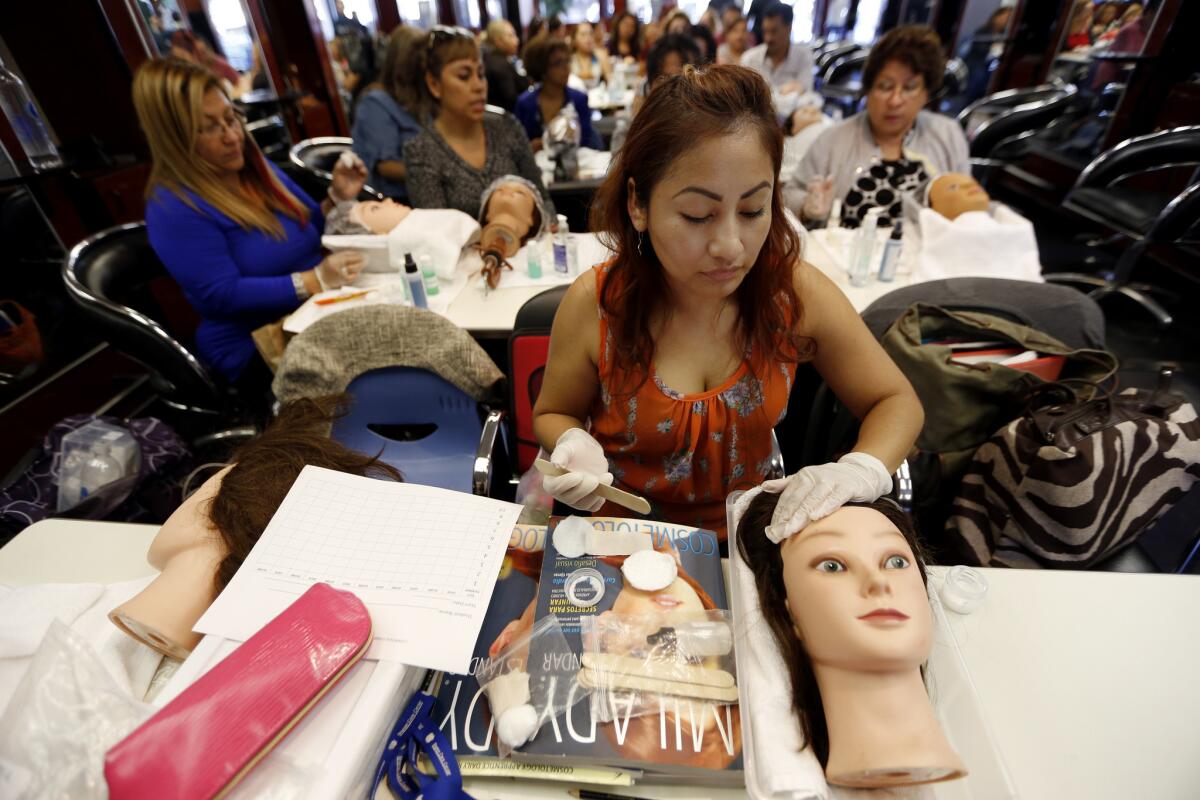‘A way for me to come out of hiding’: Immigrants in U.S. illegally are given a shot to return to their professions

Emma Juarez Lopez of Los Angeles at a beautician school. She is in the country illegally but has obtained a state license as a cosmetology apprentice. A year-old state law allows such immigrants to get professional licenses as part of an effort to assimilate the newcomers.
Reporting from Sacramento — In Mexico, Marco Nava was a trained cosmetologist working in a salon. He specialized in hair styling and coloring. But for eight of the nine years since he came to the United States illegally he toiled in the shadows, working as a field hand harvesting grapes near Porterville.
These days, Nava is back in an air-conditioned barbershop doing what he loves thanks to a year-old California law that allows immigrants in the U.S. illegally to apply for state licenses as barbers, cosmetologists, auto mechanics, security guards and other professions.
The law also covers professionals including doctors, nurses, psychologists and pharmacists.
“It was a way for me to come out of hiding,” said Nava, 32. “I no longer have to wake up at 4 in the morning to go do something that is not my profession. Now I can take care of my kids, take them to school and go do something that I love doing.”
More than 300 people have applied for professional licenses from the state under a special process outlined in the new law, which was written by state Sen. Ricardo Lara (D-Bell Gardens), whose parents were at one time in the U.S. illegally before they became citizens.
“Where someone was born does not dictate their potential to contribute to our workforce and grow our economy,” Lara said. “We have the largest immigrant population in the country and we are the eighth-largest economy in the world. In California, we know that integration works.”
California has led the nation in adopting laws aimed at easing the assimilation of those in the U.S. illegally, previously allowing such people to get driver’s licenses, college financial aid and law licenses.
Advocates for strict immigration enforcement, including William Gheen, said the state cannot adopt measures that conflict with federal laws that make it illegal to hire someone who is not in the country legally — or even help them get a job.
“California lawmakers should be focused on helping the American citizens they have sworn to serve instead of illegal invaders that take U.S. jobs and taxpayer resources and corrupt our elections,” said Gheen, president of Americans for Legal Immigration Political Action Committee.
California’s workforce includes 1.85 million people in the U.S. illegally, according to an estimate by the Public Policy Institute of California.
Until Gov. Jerry Brown signed the new law, professionals in California had to obtain licenses by submitting their Social Security numbers as proof of citizenship.
The law allows the state’s 40 licensing boards to accept a federal taxpayer identification number, which those working in the country illegally can obtain in lieu of a Social Security number.
The most sought-after licenses so far are for barbering and cosmetology, which had 151 applicants. Second was cemetery operator licenses, which saw 36 applicants, followed by security guard licenses, which drew 32 applications.
There were 24 applicants for automobile repair licenses, 15 for registered nurses, 14 for vocational nurses and seven for dental hygienists. Five people applied for dental licenses. No one has yet sought a license to work as a physician.
Lara said many of the professionals getting state licenses were already doing the work in California, but without state permits and the training required to make sure they do their jobs in ways that do not jeopardize public health.
“By improving access to professional licenses we will increase tax revenues, utilize an untapped worker population and promote stronger communities,” Lara said.
To obtain a professional license, workers must undergo training and pass a test showing that they know how to operate safely with proper hygiene and sanitation so the public is protected, said Julie Landeros, an administrator at the state-licensed Cosmetica Cosmetology and Barbering Apprenticeship Program in Downey.
“It’s amazing,” she said of the new law, “because before there were a lot of undocumented people doing this work already. Now these people can be regulated.”
The training program’s students include Nancy Gonzalez, 35, of San Fernando, who said she was grateful for the ability to get a state license even though she is in the U.S. illegally.
Gonzalez and Nava said it also helps their businesses to be able to show clients a state license.
“I feel free,” Gonzalez said in Spanish, with Landeros translating. “I am happy because I can now help my family, my husband in a much better way without fear that an inspector can come in at any time and give me a $1,000 fine for working without a license.”
Follow @mcgreevy99 on Twitter
ALSO:
There’s been a boom in driver’s licenses issued to immigrants here illegally
What happened to the president’s immigration programs
More to Read
Get the L.A. Times Politics newsletter
Deeply reported insights into legislation, politics and policy from Sacramento, Washington and beyond. In your inbox three times per week.
You may occasionally receive promotional content from the Los Angeles Times.











